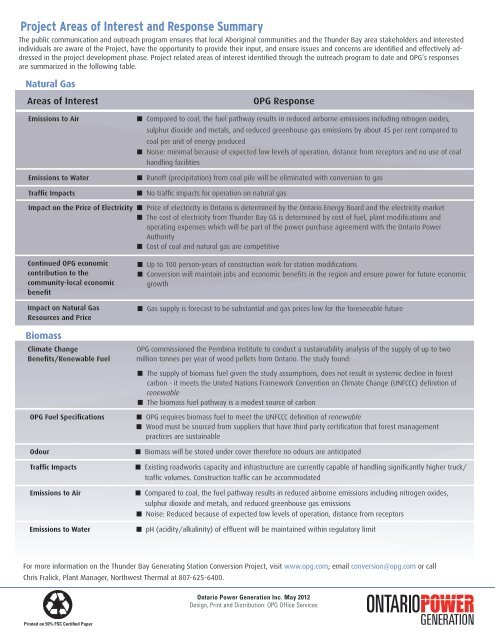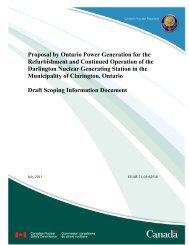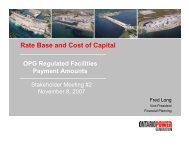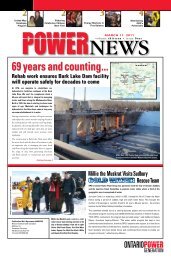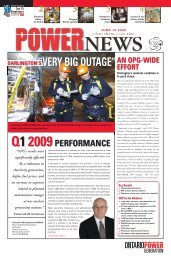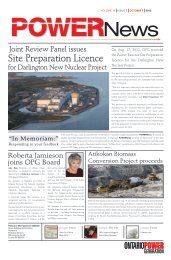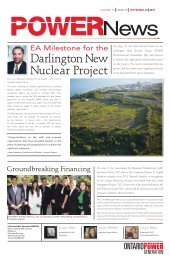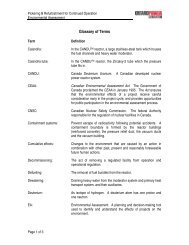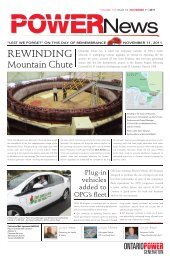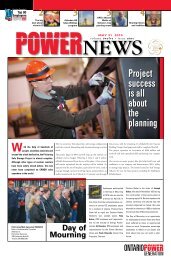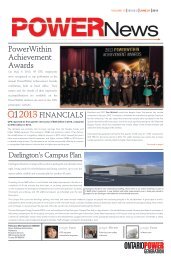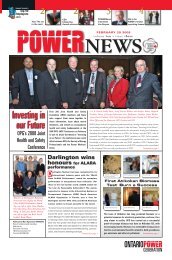Thunder Bay Conversion Fact Sheet May 2012 - Ontario Power ...
Thunder Bay Conversion Fact Sheet May 2012 - Ontario Power ...
Thunder Bay Conversion Fact Sheet May 2012 - Ontario Power ...
Create successful ePaper yourself
Turn your PDF publications into a flip-book with our unique Google optimized e-Paper software.
Project Areas of Interest and Response Summary<br />
The public communication and outreach program ensures that local Aboriginal communities and the <strong>Thunder</strong> <strong>Bay</strong> area stakeholders and interested<br />
individuals are aware of the Project, have the opportunity to provide their input, and ensure issues and concerns are identified and effectively addressed<br />
in the project development phase. Project related areas of interest identified through the outreach program to date and OPG’s responses<br />
are summarized in the following table.<br />
Natural Gas<br />
Areas of Interest<br />
Emissions to Air<br />
Emissions to Water<br />
Traffic Impacts<br />
OPG Response<br />
n Compared to coal, the fuel pathway results in reduced airborne emissions including nitrogen oxides,<br />
sulphur dioxide and metals, and reduced greenhouse gas emissions by about 45 per cent compared to<br />
coal per unit of energy produced<br />
n Noise: minimal because of expected low levels of operation, distance from receptors and no use of coal<br />
handling facilities<br />
n Runoff (precipitation) from coal pile will be eliminated with conversion to gas<br />
n No traffic impacts for operation on natural gas<br />
Impact on the Price of Electricity n Price of electricity in <strong>Ontario</strong> is determined by the <strong>Ontario</strong> Energy Board and the electricity market<br />
n The cost of electricity from <strong>Thunder</strong> <strong>Bay</strong> GS is determined by cost of fuel, plant modifications and<br />
operating expenses which will be part of the power purchase agreement with the <strong>Ontario</strong> <strong>Power</strong><br />
Authority<br />
n Cost of coal and natural gas are competitive<br />
Continued OPG economic<br />
contribution to the<br />
community-local economic<br />
benefit<br />
Impact on Natural Gas<br />
Resources and Price<br />
Biomass<br />
Climate Change<br />
Benefits/Renewable Fuel<br />
<br />
OPG Fuel Specifications<br />
Odour<br />
Traffic Impacts<br />
Emissions to Air<br />
Emissions to Water<br />
n Up to 100 person-years of construction work for station modifications<br />
n <strong>Conversion</strong> will maintain jobs and economic benefits in the region and ensure power for future economic<br />
growth<br />
n Gas supply is forecast to be substantial and gas prices low for the foreseeable future<br />
OPG commissioned the Pembina Institute to conduct a sustainability analysis of the supply of up to two<br />
million tonnes per year of wood pellets from <strong>Ontario</strong>. The study found:<br />
n The supply of biomass fuel given the study assumptions, does not result in systemic decline in forest<br />
carbon - it meets the United Nations Framework Convention on Climate Change (UNFCCC) definition of<br />
renewable<br />
n The biomass fuel pathway is a modest source of carbon<br />
n OPG requires biomass fuel to meet the UNFCCC definition of renewable<br />
n Wood must be sourced from suppliers that have third party certification that forest management<br />
practices are sustainable<br />
n Biomass will be stored under cover therefore no odours are anticipated<br />
n Existing roadworks capacity and infrastructure are currently capable of handling significantly higher truck/<br />
traffic volumes. Construction traffic can be accommodated<br />
n Compared to coal, the fuel pathway results in reduced airborne emissions including nitrogen oxides,<br />
sulphur dioxide and metals, and reduced greenhouse gas emissions<br />
n Noise: Reduced because of expected low levels of operation, distance from receptors<br />
n pH (acidity/alkalinity) of effluent will be maintained within regulatory limit<br />
For more information on the <strong>Thunder</strong> <strong>Bay</strong> Generating Station <strong>Conversion</strong> Project, visit www.opg.com; email conversion@opg.com or call<br />
Chris Fralick, Plant Manager, Northwest Thermal at 807-625-6400.<br />
<strong>Ontario</strong> <strong>Power</strong> Generation Inc. <strong>May</strong> <strong>2012</strong><br />
Design, Print and Distribution: OPG Office Services<br />
Printed on 50% FSC Certified Paper


